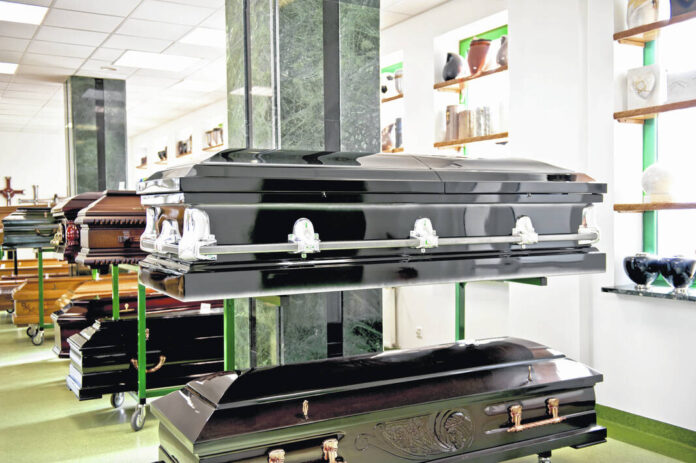Private equity firms invest in cradle-to-grave health care, literally in the latter category. A small but growing percentage of the funeral home industry—and the broader aid-in-dying market—is being gobbled up by private equity-backed companies attracted by high margins, predictable profits and the potential death of tens of millions of baby boomers.
The funeral home industry is in many ways a prime target for private equity seeking markets that are highly fragmented and could benefit from consolidation. By consolidating funeral home chains, these firms can leverage economies of scale in purchasing, improve marketing strategies, and share administrative functions.
About 19,000 funeral homes make up the $23 billion U.S. industry, at least 80% of which remain privately owned and operated — mostly mom-and-pop businesses, with a few regional chains, according to industry officials. The remaining 20%, or about 3,800 homes, are owned by funeral home chains, and about 1,000 of those are owned by private equity firms.
Consumer advocates worry that private equity firms will follow the example of public companies that have created large funeral home chains and raised prices for consumers. “The real host being served isn’t the grieving family paying the bill — it’s the shareholder,” said Joshua Slocum, executive director of the Funeral Consumers Alliance, a nonprofit that seeks to educate consumers about funeral costs and services.
While funeral price data is not publicly available, surveys conducted by local affiliates of the alliance have shown that when public or privately-backed chains acquire individual funeral homes, prices typically increase.
For example, in Tucson, Arizona, when a local owner sold Angel Valley Funeral Home to private equity-backed Foundation Partners Group in 2019, prices rose from $425 to $760 for cremation and from $1,840 to $2,485 for private burial . , and $3,405 to $4,480 for a full economy funeral.
In Mesa, Arizona, the sale of Lakeshore Mortuary to the publicly-traded funeral home chain Service Corporation International raised prices for cremation from $1,565 in 2018 to $1,770 in 2021, for burial from $2,795 to $3,680 and for economy burial from $4,385 to $5,090.
“We believe our prices are competitive and reasonable in the markets we serve,” a Service Corporation International official said in an email.
Martha Lundgren, board member of the Arizona Funeral Consumers Alliance, provided details of these price increases. She said the acquisition of funeral homes resulted in the cancellation of price agreements made on behalf of consumers who are members of the alliance. In 2020, cremation at Adera Doge Chapel in Tucson cost members $395, nearly two-thirds less than the standard price of $1,100. But after Foundation Partners Group bought the funeral home, the membership pricing agreement was scrapped and the price of direct cremation rose to $1,370.
Foundation Partners Group officials said the price increase partly reflects the higher cost of supplies such as caskets, as well as increased labor costs. But most of the increases, they said, represent a move to a more transparent pricing system that includes administrative and transportation fees that other funeral homes add later.
“We don’t use people unless they’re thinking clearly,” said Kent Robertson, the company’s president and CEO. “That’s just not who we are.”
There was a big surge of consolidation in the U.S. funeral home industry in the late 1980s and early 1990s and again around 2010, said Chris Krueger, a Phoenix-based industry consultant. And acquisitions have reached a feverish pace in the last two or three years. Many investors expect demand for death care services to rise significantly in the coming years as the 73 million baby boomers, the oldest of whom will be in their 70s, continue to age.
“The demographics themselves are obviously in everyone’s favor here,” Krueger said. Funeral homes already have attractive margins, and networking to share administrative costs can increase profits even more.
Meanwhile, many funeral home owner-operators are reaching retirement age and there is no one in the family willing to take over the job. A 2021 survey by the National Funeral Directors Association found that 27% of owners planned to sell their business or retire within five years.
The desire to sell, combined with investment money pouring into the field, has pushed funeral home prices to new heights. Before private equity took notice of funeral homes, they were selling three to five times their annual revenue. “Now I’m hearing from seven to nine,” said Barbara Kemmis, executive director of the Cremation Association of North America, a trade group for the cremation industry.
The value of funeral homes lies not only in their physical assets. Funeral directors are often integral parts of their communities and have established considerable goodwill with their neighbors. So when corporate chains acquire these houses, they rarely change the name and often keep the former owners around to smooth the transition.
Tony Cummings, president of NewBridge Group in Tampa, Florida, helps sell funeral homes. Many of his clients are still skeptical of the big firms and often take less money to sell to someone they believe won’t tarnish their hard-earned reputation. Most former owners plan to live in the community and don’t want their friends and neighbors to be mistreated. “I’m not saying anybody’s going to take half of what another company is offering,” Cummings said. “But now there are two big items to sell: money and the right cut.”
Five years ago, when Robert Olthoff decided to sell his family’s funeral home in Elmira, New York, he contacted some of the larger publicly traded funeral home chains. But when representatives of numerous companies visited him to make their offers, Olthoff realized that none of the major chains had sent someone with experience in serving the business. “Accountants were sent, lawyers were sent,” he recalled. “It was all about numbers, numbers, numbers. And I didn’t like it.”
Instead, Olthof sold to Greg Rawlings, a former funeral director who amassed a private funeral home chain of 90 locations in the Northeast. Rawlings was offered less money than the major chains, but he knew what it was like to wake up at 2:30 a.m. and put on a suit to help a grieving family. He knew what it was like to bury a child.
“I can’t put a dollar amount on what it’s really worth selling to a funeral home person,” Olthoff said. “Because moving forward, your name will still be on the front of this building.”
Victoria Hanneman, a professor at Creighton University School of Law who studies the funeral home industry, worries that the new corporate ownership could be devastating for grieving families. “They don’t behave like normal rational consumers,” she said. “They do not trade because death is seen as an inappropriate time for trading.”
For most families, a funeral will be one of the biggest expenses they will ever incur. But they often enter the buying process cognitively impaired by grief and unsure of what is normal and appropriate.
According to a 2022 survey commissioned by the Consumer Federation of America, only one in five consumers visit more than one funeral home to get a price list. And online comparisons are virtually impossible – research by the Funeral Consumers Federation and Alliance found that only 18% of the funeral homes they sampled listed prices on their websites. As a result, families tend to rely heavily on the expertise of a single funeral home that has a motive to sell them the most expensive options. As a result, consumers may be pushed to purchase open-casket funeral packages that include embalming and other services that increase the cost and may not be necessary.
https://www.limaohio.com/news/business/2022/10/01/death-is-anything-but-a-dying-business/



